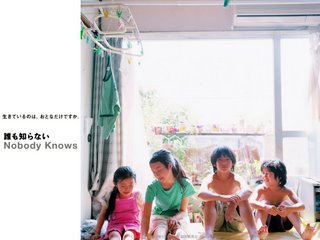
Yesterday night, my wife and I watched a Japanese movie, "Nobody Knows."
The movie is about four children in Tokyo who don't have father and mother.
Each child has a different father. Their fathers don't have any resposibility to raise their children.
Mother, who was a single mother, got married another guy in Osaka. Mother didn't come home anymore...
It is a very sad story, based on non-fiction.
The following is a professional review from the
Washington Post.
Nobody Knows': Unforgettable
By Desson Thomson
Washington Post Staff Writer
Friday, February 25, 2005; Page WE39
WITH EACH passing minute of Hirokazu Kore-eda's subtly heartbreaking "Nobody Knows," the hopes of four children ebb away like spilled blood. Their hopes, that is, of a normal, happy life; of salvaging their already compromised innocence.
This Japanese movie could be a straight-out thriller if knives and guns and scary bad men were involved. But the threat here is a mysterious mother who leaves these children in a Tokyo apartment to fend for themselves. And the slow passage of time, without her, tells 12-year-old Akira, 10-year-old Kyoko, Shigeru, 7, and Yuki, 4, that they have been abandoned. That they are forgotten, unwanted and, in a sense, marked for oblivion.
But as the movie unfolds, you also realize this drama is a call to heroism. The children's safety depends on the plucky Akira (Yuya Yagira), who does everything he can to maintain a household without adult supervision and, eventually, without money.
Akira's mother, Keiko (a Japanese actress and columnist named You), moves into a Tokyo apartment complex with Akira but smuggles in her other three kids. She's afraid of eviction and attention. Clearly, she has done this before. We learn soon enough that all four come from different fathers and that Keiko has no intention of sending them to school.
She reminds them of the "rules" to stay out of sight and inside the apartment. Kyoko (Ayu Kitaura) the oldest girl, must do the laundry at night when no one is around. And Shigeru (Hiei Kimura), a hyper child who entered the flat hidden inside a suitcase with his younger sister, Yuki (Momoko Shimizu), must learn to curb his outbursts.
Not long after they have moved in, Keiko disappears. She comes back once or twice, but, essentially, Akira becomes the head of the cramped household. He has to depend on the cash his mother sends him.
"I'm not allowed to be happy?" Keiko protests when the soft-spoken Akira brings himself to confront her. In her breathy, childlike voice, she also points out that a famous wrestler and a Japanese president never attended school. She promises to come back for Christmas.
When the money stops coming in, Akira and Kyoko realize they are in this for the long haul and that sooner or later the outside world cannot be kept out.
Inspired by a true story from the 1980s, in which four children were left alone for months, director Kore-eda used non-actors in the children's roles and filmed them chronologically over the space of a year. Their remarkable lack of self-consciousness, the literal passage of time during which we can actually denote growth changes, and Kore-eda's quasi-documentary style, give this movie a stunning credibility.
There are poignant touches embedded everywhere. You have to find them yourself. Kyoko doodles on a piece of paper that happens to be a final notice gas bill. She also tinkers on a toy piano, which tells us about the talent she's not getting to reap. Shigeru chews on a piece of paper to stave off his appetite, and it seems that his obliviousness to what's going on amounts to self-protection. Akira enjoys a brief turnout for a baseball team in the local park. But it's an all-too-short taste of the happiness he's denying himself.
In a sense, "Nobody Knows" ("Dare Mo Shiranai" by its Japanese name) is a troubling counterview to Peter Pan. It tells us the child's world of make-believe simply cannot exist without adults, even such moral monsters as Keiko. But Akira's determination to keep not only himself but his siblings provided for, even if it means shoplifting or filling a bucket of water from the fountain in a public park, is the film's emotional driving force. It also gives us heart -- something in short supply at Apartment 203. It should come as no surprise that teenage actor Yagira won the acting prize at the Cannes film festival last year. Watching him, you'll feel like handing him the trophy yourself.
NOBODY KNOWS (PG-13, 138 minutes) -- Contains mature and troubling themes. In Japanese with subtitles. At Landmark's E Street Cinema.
© 2005 The Washington Post Company



